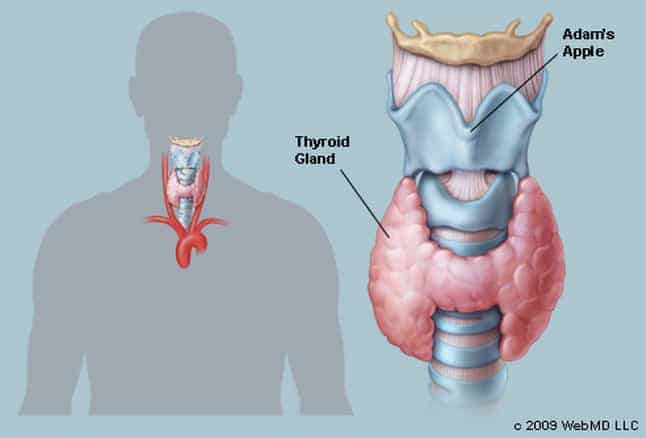Our thyroid could be thought of as the headquarters of our body, as every major metabolic function of the body is regulated through this organ. The thyroid is butterfly shaped and situated in the base of your neck. The thyroid gland releases hormones in your body that are responsible for regulating vital functions such as:
- Breathing
- Heart rate
- Central and peripheral nervous systems
- Metabolic rate
- The building of new proteins
- Menstrual cycles
- Body temperature
- Cholesterol levels
Symptoms of an underactive thyroid
As the thyroid gland regulates so many functions in the body, it shouldn’t come as a surprise that an underactive thyroid can cause many health issues:
- Fatigue
- Lethargy
- Depressed mood
- Weight gain
- Difficulty losing weight
- Forgetfulness
- Difficulty with concentration and focus
- Constipation
- Muscle cramping or discomfort
- Joint discomfort
- Feeling cold
- Light-headedness
- Dry hair and skin
- Hair loss
- And more
Symptoms of an overactive thyroid
- nervousness, anxiety and irritability
- hyperactivity – you may find it hard to stay still and feel full of nervous energy
- mood swings
- difficulty sleeping
- feeling tired all the time
- sensitivity to heat
- muscle weakness
- diarrhoea
- needing to pee more often than usual
- persistent thirst
- itchiness
- loss of interest in sex
Factors effecting thyroid health
Stress is a major factor influencing thyroid health. When in stressful situations, stress hormones will be released, supressing the release of thyroid stimulating hormone (TSH). As a result, the production of thyroid hormones reduces. Since every cell in the body uses thyroid hormones, numerous symptoms can appear.
As regards the diet, studies have shown that soy products have a negative effect on thyroid health. Also, high consumption (5 tablespoons of artificial sweeteners per day) of artificial sweeteners can cause thyroid dysfunction. Finally, crash diets, meaning eating calorie restricted, can lower the thyroid hormone levels by as much as 66%!
Diet and lifestyle changes improving thyroid health
Thyroid function can be supported through some diet and lifestyle changes. Lowering stress levels is essential to maintaining a healthy thyroid. There are many ways to help counter stress in your life, but getting a good night sleep might just be the most important one. Try to turn off any electrical devices at least 30 minutes before bedtime and engage in an activity that relaxes you. Make sure you go to bed before 10 pm and try to get 8 hours of sleep. Another way to lower stress levels is to exercise regularly and focus on breathing techniques.
Nutrition for thyroid support
To support thyroid health, a few nutrients are essential, including iodine, iron, magnesium, selenium, zinc, vitamin A, vitamin B12 and omega-3 fatty acids. These nutrients are required to forward a signal from the brain to the thyroid, which causes production and activation of hormones.
From a nutrition standpoint, there are several foods with high concentrations of nutrients which support thyroid function, such as:
- Sea vegetables
- Brazil nuts
- Wild salmon
- Fermented foods: Kambucha, sauerkraut, Greek yoghurt
- Eggs
- Sesame seed
- Pumpkin seeds
- Grass-fed beef
- Spinach
- Scallops and shrimps
- Cashews

“If you’d like some dietary and lifestyle recommendations contact us today to arrange an Epigenetics Wellbeing Assessment.”

